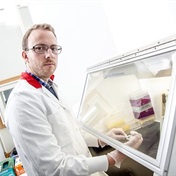Scientists have unravelled exactly how opium poppies produce a non-addictive compound that can both suppress coughs and kill tumour cells, paving the way for improved production of the medicine.
Opium poppies, the source of illicit heroin, are also important for producing morphine and codeine, along with noscapine, which has been used for decades as a cough suppressant.
More recently, researchers have found noscapine is also a potent anti-cancer agent, prompting clinical tests into its role in fighting blood cancer.
The discovery that a cluster of 10 genes is responsible for the synthesis of noscapine inside the poppies means plant breeders can now develop high-yielding varieties. It may also help scientists produce the drug in factories in the future.
The findings by researchers at the University of York and GlaxoSmithKline were published in the journal Science.
Cost effective
British-based GSK is a leading producer of opium-based ingredients, supplying around 20% of the world's medicinal opiate needs from poppies grown by farmers in Tasmania.
The fact that all the genes associated with noscapine are clustered together makes life much easier for plant breeders who can use the information to develop high-yielding commercial noscapine poppies.
In contrast to illegal opium production in countries like Afghanistan, where harvesting is done by hand by lancing poppy heads, commercial pharmaceutical production is highly mechanised, with farmers using modern combine harvesters.
That makes commercial poppy cultivation a cost-effective process, even though most medicines today are produced by chemical synthesis or biotechnology.
"The poppy plant is very efficient at producing these compounds," said Ian Graham, director of the Centre for Novel Agricultural Products at York.
Treatment for multiple myeloma
Working back from a strain of poppies producing high levels of noscapine, Graham and colleagues followed the trail of genes linked to the chemical to home in on the cluster of 10 specific genes central to production of the compound.
The cluster of genes, all of which are inherited together, is the most complex ever found in plants.
Noscapine was first discovered in the early 19th century and has been used to suppress coughs since the 1950s, but interest in the compound has grown since 1998 when scientists demonstrated that it acts as a potent anti-tumour agent.
It functions in a similar way to paclitaxel (Taxol), which was originally isolated from the bark of the Pacific yew tree and commercialised by Bristol-Myers Squibb.
Cougar Biotechnology, now part of Johnson & Johnson, has been studying noscapine as a treatment for multiple myeloma.
(Ben Hirschler, Reuters Health, June 2012)
Read more:




 Publications
Publications
 Partners
Partners










